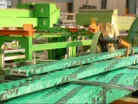ALUPCO: providing superior aluminium solutions

The Saudi Aluminium Products Company (commonly referred to as ALUPCO) is diversifying from being the top extruder and manufacturer to being able to offer its global roster of customers a fully comprehensive aluminium products offering. It is achieving this goal through a carefully considered approach that is backed up by strategic acquisitions, strategic management initiatives and focusing on operational efficiency.
Expanding operations
ALUPCO’s current aluminium operations have a current annual output of 75,000 tonnes which is achieved through nine dedicated extrusion presses. Alongside its main extrusion capability are five powder-coating lines with a total capacity exceeding 75,000 tonnes, two anodizing lines with a combined annual capacity of 12,000 tonnes and two polishing lines which together make up an annual capacity of 1,000 tonnes. These facilities are backed up by two wood finishing and two protection taping lines, as well as a thermal break crimping line.
This range of facilities enables ALUPCO to meet a range of customer needs; its planned expansion will enrich this offering. CEO Khaled Abdelmoneim explained the practicalities involved in the expansion: “Currently we are at 75,000 tonnes; first we will take this up to 85,000 by making modifications and through rolling out continuous improvements.
“We will then take production up to 140,000 metric tonnes through strategic acquisitions which we are funding with roughly $300 million. We are currently in the process of acquiring two extruders in the region; one we will acquire 100 percent and the other 75 percent. We are also getting into aluminium and ACP composites.”
The manufacturer has been so successful at fulfilling customer demand in Saudi Araba and worldwide since its inception in 1975 that it has been entrusted with supplying a range of internationally renowned projects in the Kingdom and beyond. In the UAE, these include the Emirates Towers in Dubai and the Etihad Towers in Abu Dhabi.
Perhaps the most prestigious recognition of its consistent performance is its winning of a supply contract for the Kingdom Tower in Jeddah which, once completed, will stand as the world’s tallest building at one kilometre high.
Talent management
Khaled recognised that fostering a sense of purpose in each individual worker was just as important as making sure that his teams were well trained and appropriately rewarded for outstanding work. He explained: “We carry out a training needs analysis for every one of our employees and we use this to make sure that the person is ready to take the next step in their career.”
Integrating the needs of the individual within the operational structure also enables the company to accurately allocate relevant training. Khaled said: “We have an evaluation system carried out on an annual basis; continuous feedback from management to our support unit ensures that those people have got the right training and skills, and so we can evaluate the impact of the training later on.
“We set out an employees’ training plan and ensure that they are supported through to the next assignment. The company benefits as well; this process helps us make sure that our employees have the right training for themselves and for the company. In the performance appraisal we discuss the results and how to move forward.”
According to the Central Department of Statistics and Information, women make up only 13 percent of the workforce in Saudi Arabia; there is however a culture change afoot, and Khaled was keen to keep up with this trend.
He said: “We have a quota from the government to hire Saudis and train them. We have also started to hire Saudi women and we provide specific training because it is difficult to find a Saudi female with work experience.
“We now have at least one female for each function within the company; it is strategically valuable for us to have the right mix, it changes the culture and principles of the company. There is a change in perspective in Saudi Arabia which is enabling women to become candidates for hiring.”
International standards
In 1995 ALUPCO became the first aluminium extruder in the Middle East to receive ISO 9001 accreditation, confirming its ability to consistently meet the demands of its customers. Since then, adopting international standards has been the norm for the company, as it seeks to fulfil the demands of international clients.
Since attaining this, the company has received QUALANOD certification for providing save and consistent anodised aluminium; QUALICOAT for quality coatings; and QUALIDECO for the high standard of its decorative finishes.
Khaled said: “We wanted to be the best of the best; we maintain these international standards in order to be acceptable to everybody; we even do specific regional standards for some shipping operations.”
ALUPCO is also a member of the Gulf Aluminium Council, the Aluminium Extruders Council Aluminium and the Anodisers Council, as well being SASO certified in conformity with the Saudi Government guidelines regarding the safety and sustainability of its exports.
Competitive stance
Khaled and his teams have identified where the clear challenges lie for the business and, thinking laterally, have been able to transform these potential setbacks into a competitive advantage, he said: “The challenge for us in exporting to 26 countries is always logistics because we transport by weight and volume, this is a burden to move products from Saudi to Europe to North Africa – it takes land as well as ocean and sometimes even air freight. With this in mind we designed for every profile to reduce the volume during shipping.”
Despite the recent slump in the global commodities market ALUPCO is poised to make significant gains, both in terms of its productivity, but also through increasing its market share. Once again management has leveraged a potential problem to its advantage. Khaled said: “Going forward, we will be giving better solutions and changing the way we buy and sell, and order commodities, as well as communicating with our customers more dynamically.”

